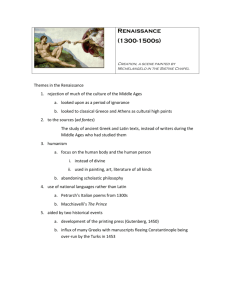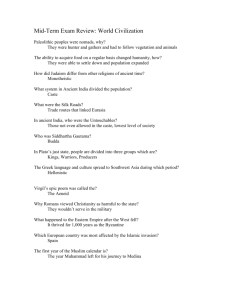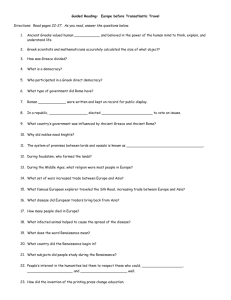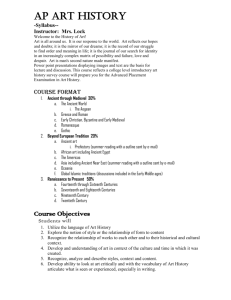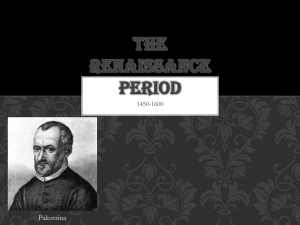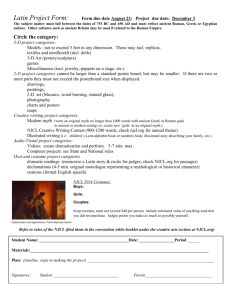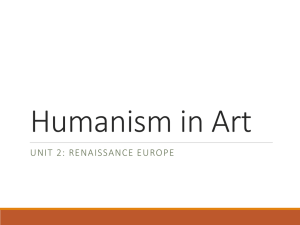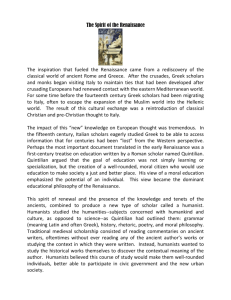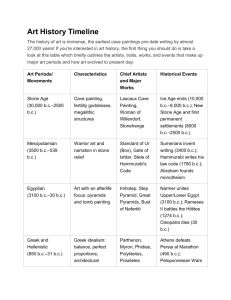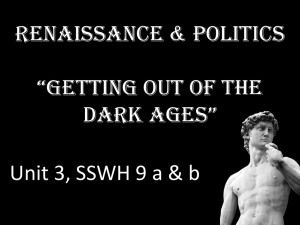The Italian Renaissance and Beyond: The Politics of
advertisement
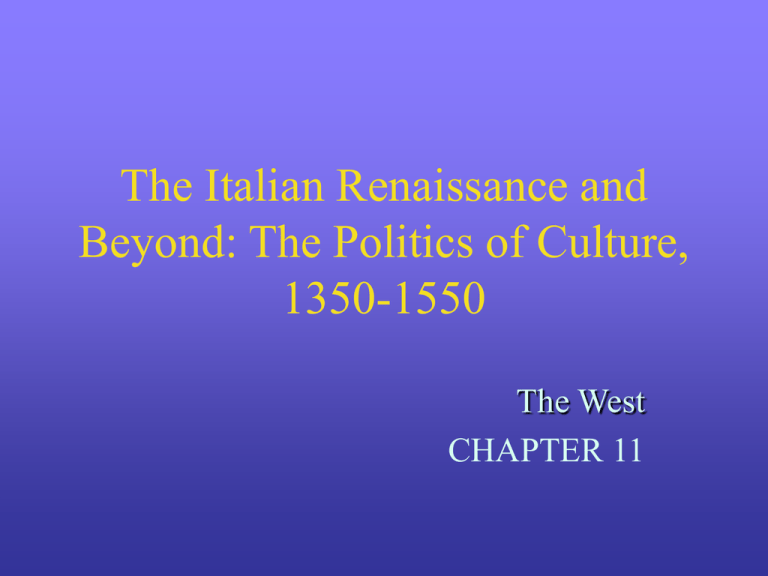
The Italian Renaissance and Beyond: The Politics of Culture, 1350-1550 The West CHAPTER 11 The Renaissance Republics: Florence and Venice • Dynamic political and social life created an environment of competition and freedom • Dominant patriciates competed for public recognition and fame, through patronage • Artistic and scholarly creativity fostered by competition between many patrons Princes and Courtiers • Patronage confined to prince and his court • The ideal prince was a paternal figure: a warrior, a scholar, a diplomat and a generous patron Frederico II da Montefeltro (1422-1482), Isabella d’Este (1474-1539) • Evolution of courtly manners based on the need to maintain appearance • The ideal courtier cultivated nonchalant ease Baldassare Castiglione (1478-1529) The Renaissance Papacy • The Renaissance pope was both priest and prince • Need to regain control of the Papal State • Political and military adventurism Alexander VI (r. 1492-1503), Julius II (r. 1503-1513) • Transformation of Rome into a cultural capital - Leo X (r. 1513-1521) The Contradictions of the Patriarchal Family • Renaissance ideal of patriarchy - Leon Battista Alberti Four Books on the Family • Family was insecure and survival was often tenuous • In reality, families were matriarchal fathers were often absent or remote • Cultivation of distinct family theme Petrarch and the Illustrious Ancients • Francesco Petrarca (1304-1374) • Distinguished the human reality of the ancients from the ideals of their writings • Distinguished the ancient world as a historically specific time and place, rather than as a repository of timeless wisdom • Philological approach to ancient texts, to discern particular meanings The Humanists: The Latin Point of View • A literary movement that resurrected the use of classical Latin • Employed as teachers, bureaucrats, courtiers and ambassadors • Promoted an education that taught critical thinking • Organized experience by recovering words, models and categories of classical Latin - the Latin Point of View Understanding Nature • Humanist science looked to ancient texts, rather than to nature itself, for answers • In astronomy and anatomy, observation of nature provided knowledge that surpassed ancient learning • Application of mathematics, to art, advanced knowledge of optics • Invention of paper and the printing press widened the distribution of new ideas and discoveries Sculpture, Architecture and Painting: Real and Ideal • Creativity fueled by desire to unite the ideal and the natural in art • Use of geometry and natural proportions to create harmony - linear perspective • Chiaroscuro (“light and shade”) - imitation of natural light in painting • New techniques of oil painting, to create depth Music of the Emotions • Musical innovation was slower than artistic and literary developments • The Madrigal - musical expression of shades of meaning and emotion • Opera - continuous music to accompany a full drama • Opera became popular entertainment Monarchies: The Foundation of the State System • Establishment of professional standing armies • Systematic expansion of taxation • Elimination or erosion of urban and regional autonomy • Constraint of aristocratic and clerical independence • Institution of sophisticated intelligence networks France • Guarantee of autonomy to French Church opened clerical revenues and offices to monarch’s exploitation • Consolidation of power over nobility • Institution of the taille - direct annual tax • Patronage of Italian art and scholarship Spain • Creation of a unified kingdom. through dynastic marriages • 1492: Completion of Spanish Reconquest • Suppression and expulsion of Jewish and Muslim minorities • Financing of westward exploration. to outflank Islamic caliphates and reach Asia The Holy Roman Empire • Highly decentralized. with few unifying institutions • Creation of a Supreme Court and an Imperial Council • Institution of graded income and property taxes • Emperor dependant upon cooperation of German nobility and cities England • Civil war between feuding factions of the royal family, 1455-1485 • Recovery and stability achieved under Tudor dynasty • Court of Star Chamber punished unruly nobility • Confiscation of lands and prohibition of private armies Historical and Political Thought • Key to understanding lay in the detail of human events • Francesco Guicciardini (1483-1540) • Refined understanding of historical causation with psychological interpretations • Niccolò Machiavelli (1469-1527) • Developed ideas of political necessity and the obligation to preserve the state above all else The Politics of Culture • Attempt to re-fashion society on the model of ancient cultures • Development of a critical approach to past and present • Transformation of the Western identity, from one defined by Christianity to one based upon a common historical experience
